
In preparation for this month’s book, A Strange Stirring, we thought it would be a good idea to (re)read The Feminine Mystique. Here, J and K discuss The Feminine Mystique itself.
K: The Feminine Mystique first came out in 1963, though bits of it had been appearing in magazines for a year or so prior to its actual publication, so the public was well-primed for its arrival. The book has managed to achieve legendary status as the book that started the women’s liberation movement. I’ve actually read it several times before, but it had been a few years, and I wanted to refresh my memory before taking on this month’s Tripletake, A Strange Stirring.
J: Well, and I thought A Strange Stirring would make more sense if I read Feminine Mystique first, since I never had. But it was loooong. Worse because it had at least three introductions bfore you even got into it. I should’ve just skipped those. I frequently do.
K: As you know, I don’t typically skip introductions and epilogues or afterwards. I don’t even skip endnotes if they have additional information. (side rant: If you are going to include additional information in your endnotes, for God’s sake make them footnotes so they can be read inline with the text. It is so freaking annoying to have to flip back and forth between the end of the book and the middle I cannot even say. It’s even worse and more cumbersome in current ebook formats.) Sometimes I find they weren’t worth my time, but most of the time I find they add to the text.
J: If they’re footnotes, I’ll usually read them. Unless they’ve proven themselves to be uninteresting. If they’re endnotes, I won’t bother unless I’m really interested. So.. I did not read the endnotes. But I did read the epilogue. Which was one of the most interesting parts of the whole book, actually.
K: Now, I should note here that we both read different editions of the book and I believe some of our supplemental material was different. Mine is a reprint of the 20th anniversary edition which appears to have been put together in 1984. So it contains: “20 Years After”, “Introduction to the 10th Anniversary Edition”, the book, including the Preface, “Epilogue” and “Thoughts on Becoming a Grandmother”.
J: I’ve got a 2001 edition. Introduction by Anna Quindlen, Metamorphosis: Two Generations Later, Introduction to the Tenth Anniversary Edition, Preface and Acknowledgments. And then at the end just the Epilogue. I can’t even tell if I read the first Introduction. I might’ve skipped that one.
K: So let’s have a look at the book itself, since we can’t really compare notes on the extra stuff very well – aside from the epilogue, which we can talk about at the end. The book starts by describing the state of American womanhood. Or at least middle to upper-middle class (mostly white) American womanhood. And that state is just sad.
J: I wonder if it also isn’t skewed to the Northeast. She was mostly referencing studies of schools located in New England, wasn’t she?
K: Hmm. I didn’t really think of it that way, but flipping through the endnotes the references do seem a bit biased toward the northeast, if you dip down towards Washington and definitely include New York. But I’m not sure we can read -too- much into the origin of the studies. It is a fact that the Seven Sisters colleges were all located in the northeast, but studies of the alumnae of those colleges would take in quite a wide geographic area.
J: But it does add to the idea that.. this does not represent all women in America at the time. Though it’s also possible and likely that the Northeaster exerted an unequal effect on the culture of America at the time. A lot of the schools and academics were there. The magazines and advertising were mostly out of NYC, I believe. And things like that. Not that it isn’t still true to some extent, of course. But what might ring true for a white middle-class housewife in the suburbs of Philadelphia won’t necessarily ring true for a white middle-class woman in Topeka, or Honolulu, or Juneau. Especially as this really was just at the start of television uniting everyone. But, in any case, I’m glad I wasn’t alive then! I don’t know that I would’ve had the guts not to fall into that role and that pattern.
K: You and me both. I can see how seductive the whole idea would have been — you don’t need to go out and make your own way in the world, you can just stay home, have some babies, and then once they go to school… amuse yourself. And given that the economics of the time allowed for that, as long as you could find a husband who had a job, yeah, I can totally see it. And to be perfectly honest, without actually trying it and seeing what it felt like to be so constrained, I’m not sure I wouldn’t have been fine with it. I’m certainly capable now of frittering away my time on random stuff, so I’m not sure I would have been different then.
J: Yea. I had real trouble understanding the mindset that would spend the day… cleaning! Or baking cheesecakes or.. I don’t even know how they spent the 6 or so hours the kids were at school on housework. Or even shopping. Because they had all the appliance we did minus the microwave, pretty much. And some of the women even had a cleaning service or a housemaid or something! Like, what are you doing with your time?
K: Well, that was the subject of an entire chapter: Housework expands to fill the time available. And how many times have you seen that true anywhere else? If someone has a task to do at work, a task which really ought to take, say, 45 minutes if they concentrated and just did it — how often does that task somehow manage to take the entire day? Especially when if, on completion, it requires some thought as to what should be done next? And it’s not that they’re necessarily working the entire time, but time is wasted along the way. By becoming obsessed with an unimportant detail. Or stopping to organize something else before you really get going. Or to look at the back of this book you just picked up. But because you haven’t really done anything else the whole day, when you look back, all you see is that one task and how it took the whole day.
J: Well, I can certainly understand how it could take that long. I just can’t quite get why you’d /want/ it to take that long. You wouldn’t rather sit and watch daytime TV? Read a book instead of a magazine? I guess.. cleaning seems more productive, somehow? And you’re totally slacking off if you’re having fun while your kids at school and your husband’s working? It’s just strange to me that everyone bought into this idea. And that being a housewife was a permanent, lifelong thing. That even after the children left, they still filled their days with housework.
K: I’m not sure anyone really thought about it being a lifelong vocation or not. I didn’t get the impression it was as completely thought out as that — the idea was the women should make the home until the children were grown and out. And if you kept having babies until you were nearly 40, then you’d be practically 60 by the time that happened. And then your husband could retire and you could do retired people things. But Friedan even mentions there was some confusion on the part of the ‘authorities’ as to what older housewives should do: should they go to work? Should they stay at home and play bridge? Should they do volunteer work? It was obviously an unanwered and problematic question.
J: Well, I guess if you had enough kids over long enough time, you’d be a grandmother before you had to worry about it. So there’s your new role. I don’t think I would’ve wanted to be a man in this scenario either. But that’s because I keep picturing jobs rather than careers. You go, do your boring office job all day, come home, do nothing in particular. Spend your weekends on yardwork, exciting.
K: It’s definitely interesting how the arrangement seemed to infantilize both men and women. Women by giving them no choices and making them wholly dependent on their husbands for money, shelter, everything. And men because it expected from them absolutely no responsibility other than providing money, shelter, food for their families. They weren’t even required to be present. It was reading The Feminine Mystique that finally cleared up a confusing point for me at least. I never understood how families would “go to the seashore” or “go to the country” for the entire summer. Somehow I never picked up on the fact that it wasn’t the family: it was mom and the kids, and dad would occasionally pop in on the weekends.
J: Ahhh. So the rest of the time, while the family was away, he was spending his evenings pursuing his secret passion of splitting atoms in the basement! — But it’s interesting you used that word ‘infantilize’, because that was a big theme in the book. That nobody had grown up. And that also seemed to be Freud’s big thing. If you’ve got a problem, it’s because you’re not mature. And I just can’t agree with that. I think being an adult, acting an adult, feeling like an adult is a whole combination of things. You stick me in a situation where I’m responsible, I’m going to feel like an adult. And the women were certainly in that situation every single time they were alone with their children.
K: I think I have to disagree with you there. Yes, they were responsible for the children, but they had never had to make a big decision on their own. They’d never had to support themselves. They’d never had to take a risk. Now that I’m 35, I think I can safely say there is no time in one’s life when you actually feel like a ‘grown-up’. You just feel like you. But it’s definitely when I’m doing new things, things where I might fail, things where I’m uncertain of the outcome that I feel most accomplished and proud of myself. And energized to go do more. And Friedan’s argument is that by taking away women’s choices and herding them without question into the housewife role, they never get that. It’s easy to just do what someone else tells you to do. It’s harder to have an interest and pursue it on your own.
J: I don’t think doing those things… pursuing a degree, working on a project of your own choosing, getting a promotion at work, make you more adult. I think they make you more a whole person, yes. I think they make you a happier person. And I can’t agree that taking a risk makes you more an adult either. Or you wouldn’t look at all those skydiving, cliffjumping, adrenaline-seeking people as being, in a way, overgrown adolescents. I guess perhaps ‘making a decision’ does count. And in that case, they weren’t making too many important decisions. They’d outsourced those to their husband and society and corporations.
K: I think that’s where the disagreement is. I don’t believe that ‘adult’ is the opposite of ‘infant’. I know plenty of supposed adults who are completely irresponsible idiots, even though they somehow manage to keep a job. There are really two continuums here: one, an aged based one, where baby and adult are on the opposite ends. And one based on self-actualization, where ‘infant’ doesn’t necessarily equate to ‘baby’, but rather to someone who really has not developed their core being to the point where they are — well, as you said, a ‘whole person’.
J: I just think it’s a term she took from psychiatry or psychology or whichever and ran with. Like ‘neuroses’. You hardly ever hear people talk about those anymore. And for all she spent a chapter debunking Freud, she later used some things he said to support a different argument. About gay men in that case, I think it was. And actually I wish I had read her chapter on Freud at the time I was reading Freud in a college class. It would’ve helped me look at his views on women more clearly. Instead of me thinking he was just smoking something (other than cigars).
K: Yeah. I hadn’t really though too hard about where Freud’s theories came from, but when it’s pointed out it seems incredibly obvious. He was developing his theories in not just an incredibly sexually repressed society, but also based on the people he was treating. Who were by definition in need of therapy, since they came to see a therapist — meaning they felt something was dreadfully wrong. Anyway, I don’t think Friedan just took the term and ran with it. I think she did quite a bit of research; she references Maslow’s heirarchy of needs several times, and her theory (which I don’t believe she actually deveoped but merely supported) was very explicitly based on it.
J: She mentioned lots of things several times. I found it all quite repetitive and/or long-winded. Maybe I wouldn’t have if it was a subject I was deeply interested in. Gender in science fiction? Be as long-winded as you like if you’re telling me something slightly new or in a slightly different way. Maybe there’s some nuance I’ll get if you come at it from a slightly different angle. And I’d really want to get lots of nuances. But this book, not so much. I can see its place in femininist history, but so much of it just doesn’t apply to me that.. I’m not sure what I can do with it, you know? I actually found it most engaging when she was saying things I completely disagreed with her on. But I guess that’s true of a lot of books.
K: The repetition is something I find amazing, because it’s not something I can do. I just do not have the skill set(?) to take a single fact and somehow spin it into three paragraphs. The writing style here is more colloquial than academic, since it’s meant to appeal to a wide audience, but it has a lot in common with academic papers — the expansion of the work to fill the pages allotted as it were. :P But in spite of the repetition, I find the book more compelling than you: obviously, since I’ve read it probably a half-dozen times already. One, I’m probably more interested in history and definitely feminist history than you. Two, I really can see myself in its pages in a lot of ways. The women she’s writing about could have been me. I almost went to Smith! (I got in there.)
J: I never once questioned that I’d go to college. Or that I’d go to study something I wanted to study. Even if I never did work out what that was going to be. At least, not narrowed down to one or two things. :) I didn’t seriously consider single-sex schools though. I think they just seemed so bizarre to me and not ‘the real world’. I just can’t imagine stopping because of getting married and/or having kids. Or working to pay his school. No way! Your school doesn’t come ahead of my school. When she was talking about the previous generation, before the one she’s talking about in the book.. I did sort of try to extrapolate. Well, how did all this affect my parents growing up and how they raised me. Where does our generation fit into this?
K: As a girl intending to go into the physical sciences, I was torn. I didn’t think I’d run into any weird sexism or roadblocks, but I couldn’t discount the possibility. And I was already aware of how weird it could feel to be one of two or three girls in a crowd full of boys. Not that they were discriminating against you in any way, but it just felt… odd. Like, our school participated in what was then called the U.S. First competition, where you had to build a machine/robot to perform a particular task, and then you would compete with other schools who had a robot that did the same thing. I was on the team, but I was one of the few girls, and I was also shy, so I was sort of doubly invisible — when it came time to actually build things or use stuff in the machine shop, I mostly ended up just watching. So this was something I knew about myself: I’m not great in crowds, especially when it feels like part of the crowd has more experience than me at something. In the end, that’s why I chose Wellesley over MIT. Girls compete with each other differently, plus the classes were considerably smaller, and I knew I’d get more out of it if I went there — because I wouldn’t be able to just float through unnoticed like I could have at MIT.
J: I knew I didn’t want a small school with small classes. I liked my anonymity I guess. Binghamton wasn’t huge, but it was a university and a state school, so it seemed a lot more familiar of an environment. And I didn’t get into Middlebury or Princeton. :) I ruled out MIT because of something stupid.. like not enough language classes or no creative writing or something like that. I was interested in math and science, but not committed to it enough to give up the other things, humanities, that I wanted. I was aware I was unusual in being a girl into math and science and computers, but I rather revelled in that. But I guess where I fall down in Friedan’s vision of new and improved 21st century women is that I never picked a career and sat down to pursue it with single-minded purpose. And then fully integrated a man and children into my life. I fell down on both fronts! Because.. I think maybe in our generation and the one after it in particular, there are those of us who want to do what we want to do when we want to do it. Working a 9-5 job to get ahead and get a promotion and whatnot is not me, and I don’t think it’s a lot of other people our age either. I think more of us want to be artists or freelancers or enterpreneurs. Do what interests us, be our own bosses, and be able to stop and switch to something else if we feel like it. And I think more of us would if we ever got health care straightened out in this country. :P
K: Heh. I tend to take a more cynical view of our generation, because I feel cynical about it myself: I know for a fact that working steadily at a 9-5 job for 30 years or whatever is no guarantee of anything at all other than whatever cash I take home while I’m working. For the people working in the 50s and 60s, the unions were much stronger — there were pensions, retirement plans, even the promise of healthcare when you retired. And the promise that someday you could retire! I do not believe it will be possible for our generation to ever retire completely; we’re all going to drop dead one day at our jobs as Wal-mart greeters. There’s no optimism left in me for the future, all I can hope is that it doesn’t get too awful before my time is up. And out of that comes this other view: if the future is bound to suck, and I have no indication that it won’t, I may as well try and enjoy myself now, while I still can.
J: True, true. You don’t wait to travel, because even if you’re healthy enough to enjoy it later, you’re not going to be any richer or have any more time later!
K: Getting back to a point you made a bit ago which I jumped past, I did think hard about what was going on in my own family at the time The Feminine Mystique was written. Without getting too specific, it didn’t really apply well to my mom’s family at all. They were working class, and from what I’ve gleaned, her mom generally had a job doing something or other. But my grandmother died in 1955 and after that the nuclear family model broke down even further. On my dad’s side, I think it was adhered to fairly closely. He’s the oldest, born shortly after WWII, grandpa was a vet, etc. Pretty much the perfect 50s picture, though grandpa worked for GE in the factory, not at an office job. It seemed to work okay for them, but perhaps they were a little different in that they hadn’t moved to suburbia: they lived in what was then a rural exurb of Albany and so did a ton of their relatives. They weren’t isolated in the same way as Friedan’s housewives were.
J: I don’t know that I really know enough about my family to know how well they fit the pattern. But they definitely weren’t in what you’d typically call the suburbs. A mill city and sort of the town/village end of farm country, respectively. It was interesting that Friedan seemed shocked and appalled both by suburbs and open plan living areas.
K: I don’t know that I’d describe her as shocked and appalled, but she definitely put a finger on what was wrong with them as regards housewives: open plan means you can’t just clean a small area, you have to continually clean up a much larger one. And it’s true! If you clean up your open plan living room, you can’t leave the dishes in the sink because anyone who comes over is going to see the kitchen, too. The suburbs themselves were a problem because of transportation and lack of nearby resources. This is something I had not experienced myself, growing up in New England in areas that have been settled for hundreds of years: the towns I grew up in tended to have pockets of residential housing mixed up with commercial districts and multi-family housing and educational stuff. Whereas if you get one of those big planned communities, you could have just miles and miles of houses, meaning you’re tending to live near a lot of other families exactly like your own, and if your town is new enough, maybe other amenities haven’t even been added yet. Maybe you don’t even live in a town yet! Perhaps it’s county land and your taxes are lower, but that reduces even further the liklihood that there’s a community college or a museum or -anything- to engage your mind.
J: I can see how open plan would be attractive though. If you didn’t want to be ‘stuck’ in the kitchen. You could be doing your kitchen stuff, and… watching the living room tv. Or at least not feeling claustrophobic. But I do get the point. Moving to the suburbs would’ve been a chance for the women to make decisions, which we mentioned before. They’d certainly get a say in which suburbs, which house, maybe design the house. Interior decorate the house. Plant flowers in the garden. Etc. That’d certainly keep you occupied for a few months to a year.
K: Oh, I can see reasons for all those things. That’s why open plan is still very popular today, in spite of the fact that it really does require more work. There’s a reason houses used to have a “company parlor” that the kids weren’t allowed into on pain of death! And buying and decorating your own house is can really make you feel like you’ve ‘arrived’ as an adult. Much like a big ol’ princessy wedding or having a baby. But Friedan’s point is, no one would then look at the man and say ‘well, your life’s dream is fulfilled. You bought a house. Now just keep it clean.’
J: Good point, that.
K: I think that leads pretty neatly into one of the points of Friedan’s that’s still extremely relevant today, which is the way advertisers deliberately attempt to manipulate peoples’ insecurities to get them to buy things. Clorox wipes can kill 99.9% percent of bacteria and viruses! Read: If you fail to buy these and wipe down your doorknobs, it’s YOUR fault if your kid gets sick. But that’s very blatant: it’s obviously far more subtle than that, most of the time. Buying XYZ will make you more popular, talented, make your husband love you more, make your kids do better at school, etc.
J: Yea, I’d really love to have a look at some of that proprietary research ad agencies have done/paid for. I think it would be very fascinating.
K: Yes, I was pretty interested by the Institute Friedan visited and the consumer research they had done. I may actually be motivated enough to look into that further.
J: One thing I found interesting was.. while I knew that autism had been blamed on mothers and bad parenting, it was a very different matter to see Friedan doing that very thing right in front of my eyes.
K: It’s really only very very recently that ‘blame mom’ hasn’t been the go-to reason for an autism diagnosis. I knew you would catch that, though actually, I believe Friedan only mentions autism by name one or two times in the entire book.
J: I used to know, or think I knew, roughly what ‘schizophrenic’ meant. But between the use here and the use in Left Hand of Darkness, I don’t know anymore! She said autism was a type of schizophrenia.
K: At the time it was believed to be so. You have to keep in mind that the people diagnosed with ‘autism’ back then might not even have had what we would think of as ‘autism’ now. They definitely thought it was somehow related to schizophrenia — one old synonym for autism was ‘infantile schizophrenia’. Autism and its treatment has really changed a lot in the past 30 years.
J: That whole scientific field seems to have changed so much. And yet there’s only 4 editions of the DSM since 1952! So it’s sort of no wonder it causes controversy. Like when they finally remove hysteria as a female mental disorder, they add homosexuality. Looking at Wikipedia, it looks like the next revision might remove some of the types still listed under schizophrenia.
K: Oh, the next revision — they’ve been working on it for years and they are still arguing, even though it’s due to come out very soon. No one seems very happy with it. But I think that’s beside the point.
K: Before we end our discussion, let’s take a look at the epilogue, which I believe you said was the most interesting part to you. The epilogue was definitely written afterwards; I suspect it may have been added for the 10th anniversary, judging from its content.
J: That’s where she railed at the man-haters and the lesbians trying to derail the movement, right? And I thought it was also interesting that throughout the book she made a point of identifying prominent feminists and calling them ‘pretty’ or ‘beautiful’ and this one and that one was married happily with children. For someone identifying and naming this feminine mystique, she seems somehow closely invested in it. Or aspects of it anyway.
K: Is that how you read it? That’s now how I read it at all. Friedan was a vetran union organizer and socialist. She was trying hard to come off as ‘one of the girls’ and to make what she was saying as non-threatening as possible while still getting her point across. She went to great pains to say you didn’t have to not have children, you didn’t have to divorce your husband, but maybe you could feel better about yourself.
J: Why else mention these women were beautiful and pretty? Or that they stopped wearing bloomers in public ‘for a feminine reason: it was not very becoming’. It says to me.. we should fight for equal rights and equal pay, and still be pretty while we do it. Because we all know ‘man-eaters’ and lesbians aren’t pretty, or feminine.
K: Yes, that’s exactly what she’s saying. That’s the whole point of The Feminine Mystique in fact. That advertisers, sociologists, psychiatrists had all conned women into thinking that deviating even the slightest bit from their feminine role would make them unfeminine — they would turn into lesbian spinsters who die alone eaten by their cats. Of course the image is ridiculous as well as extremely offensive, but it’s an effective scare tactic once people have been properly brainwashed. Friedan was trying to make it clear: wanting more was not going to require you to give up your family, to give up being a woman. Most of the old time feminists, far from being the man-hating psycho-bitches you’d heard about were actually wives and mothers just like you who weren’t happy with society’s expectations. You have to understand what a big threat it was – over and over throughout the book, she has quotes from women who were on the brink of going to grad school, becoming a doctor, taking a fellowship — and they turn it down because someone tells them it will make them unattractive to men, make it harder for them to settle down and be a mother.
J: Well, maybe, then. She was writing to them, not to me. So that’s how what she said came across to me. So what she said, even in the smallest details, doesn’t hold up over time. At least not to all readers. Well, not even to all readers at the time. In my view it shouldn’t matter in the least if feminists are pretty or not pretty, married or not married, mothers or not mothers, straight or not straight. They don’t even have to be women. What matters is what they’re doing to change the world. So by saying what she does in the way she does it’s actually saying to all the other women: you don’t matter; I’m not talking to you.
K: Except that the women who already knew that were not stuck in the mystique, so exactly: she wasn’t talking to them, the book was not for or about them in the least.
J: No? What about the ‘50%’ (sic) of the population that was below average intelligence? Who she claimed were probably perfectly satisfied with a life of cleaning and housework? They weren’t also trapped in it?
K: I think now you’re misrepresenting what was actually said.
J: I really don’t think I am. I don’t want to argue it out though. We can quote it and let the blog readers draw their own conclusions.
K: Go ahead and provide a quote. While you’re looking it up, I will say something else:
K: Friedan was writing to all the women who were trapped by the ‘mystique’. The mystique was this: to find true fulfillment, women had to live a purely ‘feminine’ life: to devote herself to a man and raising his children. If she wasn’t fulfilled by this life, then something was psychologically wrong with her. Perhaps she was somehow rejecting her feminine role. Advertisers especially had an enormous investment in keeping women of all classes invested in this plan. To keep them buying cosmetics to look young and fresh, to keep them buying the latest beauty treatments and household products and gadgets. Women who had somehow managed to escape the mystique, by perhaps having progressive parents who encouraged their interests, or such strong devotion to a subject that they made a real career for themselves — they were still affected by it, but they were not Friedan’s target audience. Women who were content with their life also weren’t her target audience, though I think she felt there were probably fewer of those than surveys showed.
Housework, no matter how it is expanded to fill the time available, can hardly use the abilities of a woman of average or normal human intelligence, much less the fifty per cent of the female population whose intelligence, in childhood, was above average.
Some decades ago, certain institutions concerned with the mentally retarded discovered that housework was peculiarly suited to the capacities of feeble-minded girls. In many towns, inmates of institutions for the mentally retarded were in great demand as houseworkers, and housework was much more difficult then than it is now.
J: Except I will say her target audience was also the educators and psychiatrists and the doctors who were all teaching and treating these women. Which might have included some of the people she was excluding. What do you think a gay educator would’ve thought of her entire book after being slammed for being stunted in his growth and a mama’s boy? So I don’t think that it’s out of order for me to say.. here are people she’s leaving out and/or alienating. And in reference to the quote, I didn’t remember she included average intelligence women in her mention of housework there. But her math still bugs me! If half are above, then half are below, and nobody is average intelligence.
K: That’s no different than what I remembered. She’s being insulting toward housework, and pretty much toward anyone who finds it fulfilling and thinks it’s any sort of substitute for an intellectual challenge. Which anyone would be hard pressed to argue with! And yes — you’re right, she was not all inclusive. But you can’t read a book written in a specific time and place and expect it to reflect the values of a different time and place. I’m not going to argue with you regarding her statement about averages, except to say I don’t think it’s quite as wrong as you seem to think.
J: Except I can only read it as a 2011 reader. Would I think it was awesome and mind-blowing if I was caught in the mystique myself at the time? Probably yes. However, what would I have thought if I was a gay man reading it? Quite possibly I would’ve been hearing things I’d already heard and either being depressed or angered or both by it. In either case, I’m only imagining it, picturing myself in that situation. And this is way more meta than I thought this conversation was ever going to go. Points we agree on — It’s an interesting historical feminist book that explains an interesting historical phenomenon. It’s an important book. It’s worth reading now and it was even more worth reading then.
K: All right. I’m happy to leave it at that. I’ll be interested to see what you think about A Strange Stirring, which strives to both evaluate it and put it in a wider context.
J: I’ll tell you, right about now I wish A Strange Stirring was a mystery that takes place at a Starbucks.
K: I… would not be surprised if next year there was a book by that title with a similar premise. Series mysteries are out of control!
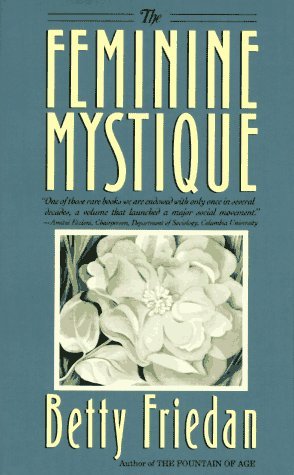

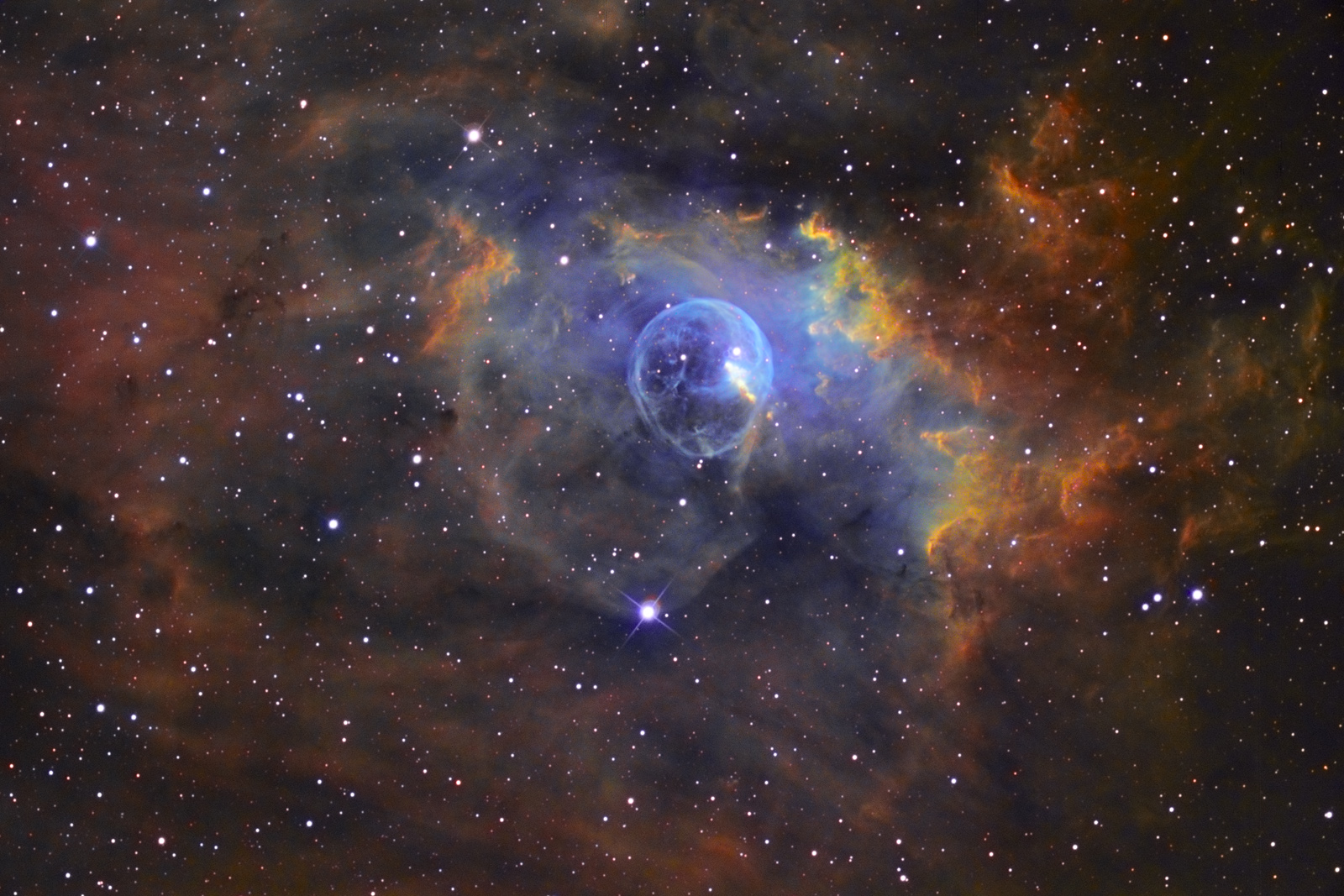
 J: So from 1965 to 1970 is a short decade, but there was a tie in there, so it was actually 7 books. And the first thing I notice about them right off is that they’re all science fiction. Various kinds of sf, but not a single fantasy in there.
J: So from 1965 to 1970 is a short decade, but there was a tie in there, so it was actually 7 books. And the first thing I notice about them right off is that they’re all science fiction. Various kinds of sf, but not a single fantasy in there.
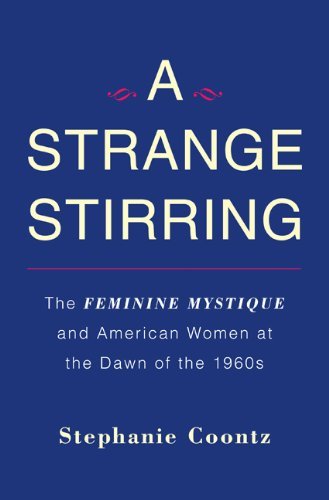
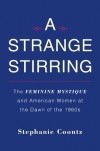 The Plot
The Plot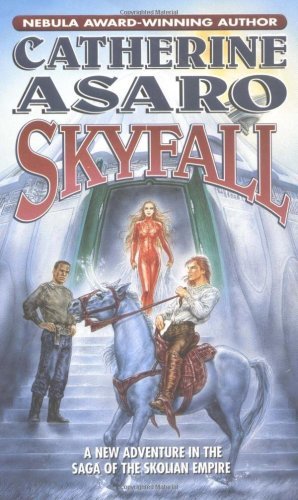
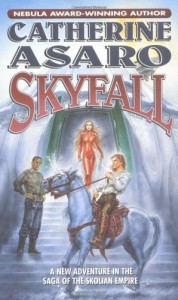
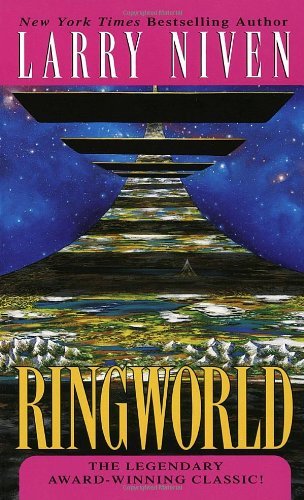
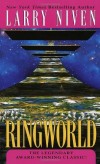 On his 200th birthday, Louis Wu is recruited by an alien to join an expedition to an unknown destination. The reward is the plans for a spaceship drive beyond anything the human race has yet invented. He and the other recruits soon discover their destination is Ringworld, a sort of modified Dyson sphere which consists of a single ring spinning around a sun. Louis, his girltoy, and two aliens soon crash into Ringworld and must try to discover just what it is, who made it, and how they can escape.
On his 200th birthday, Louis Wu is recruited by an alien to join an expedition to an unknown destination. The reward is the plans for a spaceship drive beyond anything the human race has yet invented. He and the other recruits soon discover their destination is Ringworld, a sort of modified Dyson sphere which consists of a single ring spinning around a sun. Louis, his girltoy, and two aliens soon crash into Ringworld and must try to discover just what it is, who made it, and how they can escape.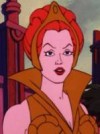 [At least I never slept with Prince Adam.]
[At least I never slept with Prince Adam.]